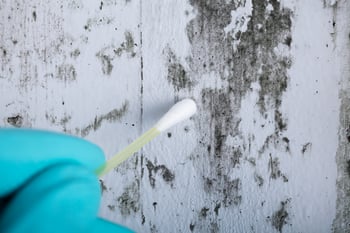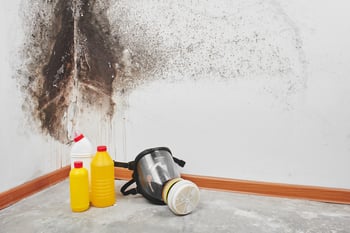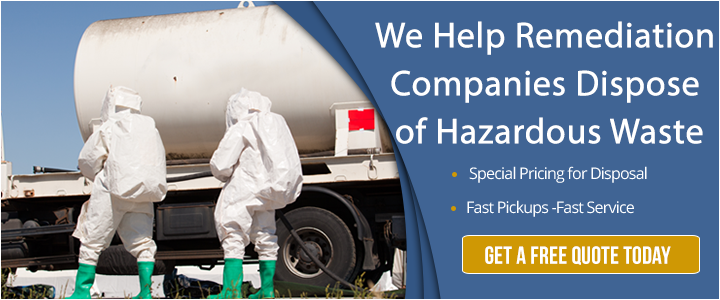Setting your mold remediation company apart from the competition can be challenging. After all, all companies promise customers that they will take care of their mold issue.
However, not all mold remediation companies are created equal. Some view jobs as an opportunity to provide a long-term solution for clients, while others simply apply the equivalent of a band-aid.
If you’re looking for ways to make your business stand apart from the rest and develop relationships with customers that can then turn into referrals, here are three ways to become one of the best mold remediation companies in the industry.
1. Offer Remediation … Not Removal
Mold remediation and mold removal services are often used interchangeably. However, those experienced in the industry know they are not the same.
used interchangeably. However, those experienced in the industry know they are not the same.
Many companies looking to make a quick buck will go into a home or business and successfully remove the mold. However, if you don’t get to the root of the problem, you’re simply leaving your customers with a false sense of security.
The best mold remediation companies implement a multi-step process that keeps fungi at their natural levels. After all, fungi is everywhere. Experts estimate there’s up to 5 million species of fungi in the world and many types of mold.
While a company can offer to remove the mold using a cleaning procedure, the mold will continue to grow back. The key is to control the mold’s growth.
Mold remediation not only removes mold that is present, it also addresses what is causing the mold growth in order to keep the outbreak from happening again.
A typical mold remediation specialist will perform a process that may include:
- Conducting a series of tests to determine which type of mold is growing
- Identifying and repairing the source of the problem that is leading to the mold growth
- Dehumidifying the affected areas so that they return to levels that will not promote mold growth
- Containing the area to prevent mold spores from spreading to other areas
- Removing any materials not part of the structure that have been affected by the mold
- Treating the mold with an agent that lifts it off any structural surfaces
- Vacuuming the area with a HEPA vacuum that captures the mold
- Applying an antimicrobial agent, which offers a final protective coat
Seasoned mold remediation experts know mold isn’t always visible. In addition to testing visible molds, the best mold remediation companies will also identify areas where a problem may not be obvious … yet. This preventative measure can go a long way with clients, letting them know you have their best interest at heart.
2. The Job Is Not Done, Even When Remediation Is Complete
Even when the mold remediation process is complete, one of the ways you can set your business apart is by offering air quality tests to ensure the mold issue has been properly addressed.
ways you can set your business apart is by offering air quality tests to ensure the mold issue has been properly addressed.
Some remediation companies don’t offer this important final step, which can be a big red flag for potential customers who are looking for the best mold remediation company to take care of their problem. After all, it’s impossible to know whether a mold issue has been properly addressed and that any health risks have been eliminated unless an air quality test is conducted.
Molds produce allergens, which can cause allergic reactions in individuals. In some cases, they can also produce toxic substances called mycotoxins, according to the U.S. Environmental Protection Agency (EPA). In real estate, mold remediation may be a condition when a property is purchased. Offering an air quality test as part of your remediation services is highly recommended since it can help you secure contracts with or referrals from real estate companies.
Make sure you use a third party provider for this air quality test, however, to ensure no appearance of impropriety.
3. Partner With A Hazardous Waste Disposal Company
Once remediation work is completed, any chemicals and materials used during the process must be properly disposed of according to local, state and federal laws. This becomes particularly important if this waste is considered hazardous.
used during the process must be properly disposed of according to local, state and federal laws. This becomes particularly important if this waste is considered hazardous.
Clients, especially companies that must follow environmental regulations themselves, want to ensure that anything removed from their properties is properly disposed of. That’s where a hazardous waste company can help your mold remediation business stand out above the rest.
As a remediation company, you are helping other companies protect the environment and the public by taking the needed steps to remediate a mold problem. Your reputation is at stake, as is the reputation of the client you are servicing.
Regulations are also always changing. Here’s one scenario you may face as a mold remediation company:
A company hires you to treat a mold issue it discovered. You determine one of the steps you will take to remediate the mold issue is to remove treated wood that has been damaged by a black mold infestation. At the end of 2020, California added treated wood to the hazardous waste list. That means you must now view this damaged treated wood as hazardous waste and take all the appropriate actions to dispose of it properly. If you don’t regularly deal with the proper disposal of hazardous waste, and a mistake is made, this can land you in legal trouble and bring unwanted attention to your client.
Mold remediation projects can also be massive in size with factors such as air quality and the contamination of structures impacted. Because mold can grow on virtually any material as long as there is moisture present, your particular strategy must ensure all federal and state guidelines are met.
Developing a relationship with waste disposal services ahead of time can keep your business moving and ensure there are no hold ups once remediation services have been completed. Working with an experienced waste disposal company can also help ensure you are staying on top of changing legislation so that your mold remediation business remains compliant and your customers remain happy.


Comment